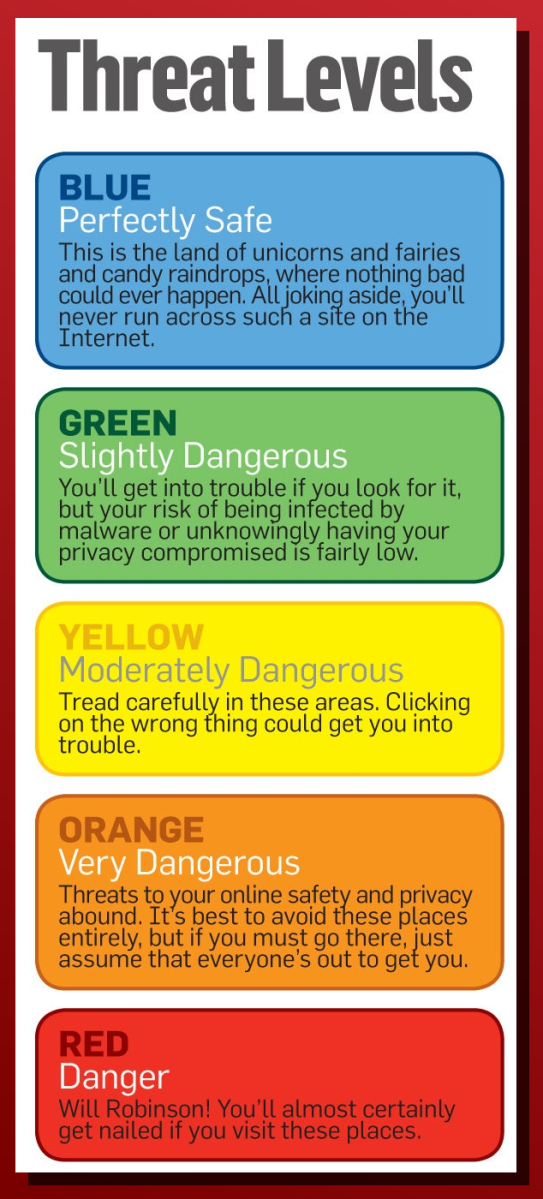The internet might be more sanitized than it was in decades past, but it’s still plenty dangerous. You’ve been warned that the web is a security minefield—that it’s easy to get in trouble. You can do everything right and still be taken by a malware infection, a phishing scam, or an invasion of online privacy. We want to help.
Here are some of the most dangerous threats on the internet and what you can do to stay out of harm’s way. Not all web dangers are created equal, though. Indeed, some threats will actively come looking for you while others you may never see if you don’t seek them out. Let our threat level indicator be your guide:

Foundry
Threat 1: Misinformation
Where it happens: Social media

Foundry
You know this one already, but we’re all as susceptible as ever. As social media algorithms continue to curate content, create bubbles, and spur echo chambers, they’ve become better at pushing misinformation in stories and images that seem like they could be true—and that’s often all it takes. Once you’ve clicked through, you’ll be susceptible to further misinformation that reinforces the faux story that caught your interest, and it’ll tell the algorithms to keep pushing more of that kind of content that interests you, sending you down the wrong path.
How to stay safe: While cutting out social media altogether is the best answer, it just isn’t practical for most of us. You can protect yourself against social media misinformation by actively analyzing all stories, images, and links you come across. If it seems designed to provoke an emotional response in you, pause and reconsider. Double-check all stories with trusted third-party sources. And lastly, think about leaving certain social media sites that are inundated with misinformation and move towards ones that are better moderated and more open.
Threat 2: Deepfakes and AI scams
Where it happens: Just about everywhere

Foundry
This one’s tricky because you’re just as likely to find deepfakes and AI scams in your email inbox as you will on social media, on YouTube, and ads all across the internet. The dangers are equally varied. A deepfake (which is a video or audio that’s been digitally altered to appear as someone else) can damage someone’s reputation, lead you to believe misinformation, or incite you to feel negatively towards certain groups, countries, or organizations. Meanwhile, AI scams can catch you off guard and hack your data or steal your personal information.
How to stay safe: Deepfakes and AI scams are by nature hard to spot, which is why you need to develop a healthy skepticism towards everything on the internet. Remember that disinformation campaigns, hackers, and bad actors are all trying to prey on you in some way. Always question any video or audio that seems alarming or sensational.
Threat 3: Lookalike URLs
Where it happens: Your browser’s address bar

Foundry
With phishing scams on the rise, you’re likely to encounter lookalike URLs in fraudulent emails, but you’re also likely to run into this if you often type URLs directly into your browser’s address bar. If you mis-type a popular website—for example, goggle.com instead of google.com—you could end up on a fake site that imitates the one you meant to visit. It doesn’t happen all the time, but when it does, it’s because the fake site’s owner wants you to input your login credentials so they can steal them.
Similarly, you may run into scam links on the web that replace certain mundane characters with lookalike letters, such as from the cyrillic alphabet. When you’re in a rush, you may not easily spot the difference between realsite.com and rẹalsite.com.
How to stay safe: Double-check every URL you type into a browser, and double-check every link you click on by hovering your mouse over it and looking at the URL preview at the bottom of the browser. When in doubt, it’s safer to type in a URL than it is to click on a link.
Threat 4: QR code scams
Where it happens: The real world

Foundry
QR code scams are particularly nefarious because they can follow you into the real world. They’re commonly found on parking meters, restaurant menus, bulletin boards, or outdoor venues that offer Wi-Fi access. Scammers and criminals stick their own fake QR codes on top of the original ones—often with a literal sticker—and it sends you to an imposter site that steals your logins, details, and/or financial information.
How to stay safe: Before scanning any QR code, double-check that it’s from a legitimate organization. When scanning QR codes in public, make sure it isn’t a sticker. Also, remember that QR code scams simply take you to fraudulent sites, so double-check that you’ve arrived on a legitimate page that doesn’t have any red flags. If it seems off, close the tab.
Threat 5: Malvertising
Where it happens: Streaming sites

Foundry
Who hasn’t visited ad-infested streaming sites to watch TVs shows without suffering Netflix’s or Disney’s increasingly expensive paywalls? Doubly so for live sports! If you’ve ever pirated a soccer stream or boxing pay-per-view, then you know the kinds of sketchy sites I’m talking about. The risk here is that these sites are funded via ads, but most ad sellers don’t want to be associated with such illegal activity—so these streaming sites have to be less scrupulous with which ads they accept, and that means their ads can contain malware. This is known as “malvertising.”
How to stay safe: Not only should you never give these sites your personal or financial information, you should never click on any of their ads. Also, make sure your antivirus software is up-to-date and working properly before visiting such sites. (You are using antivirus, right?) Consider using a VPN, too. These sites are illegal, after all.
Threat 6: Dangerous ideologies
Where it happens: Discord, Telegram, WhatsApp, other modern communication apps with weak moderation
Melden Sie sich an, um einen Kommentar hinzuzufügen
Andere Beiträge in dieser Gruppe

For a while now, it’s been possible to use handheld gaming controller

Laying down the better part of a grand for the newest, most powerful

You likely have a smart assistant on your phone, a robot vacuum


Researcher IDC has unexpectedly concluded that the current administra

If you mostly work, stream, or browse from home, then you need a dece

The weather is warming up and we’re all dreaming about days loun
